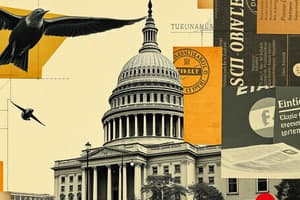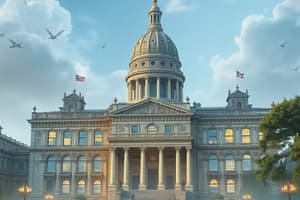Podcast
Questions and Answers
What is a Constitution?
What is a Constitution?
document stating the rules under which a government will operate
What is an Economic Depression?
What is an Economic Depression?
A period when business activities slow down, prices and wages drop and unemployment rises
Who is an Executive?
Who is an Executive?
person who runs government and sees the laws are carried out
Who was Daniel Shays?
Who was Daniel Shays?
What did the States Constitution do?
What did the States Constitution do?
What were the Articles of Confederation?
What were the Articles of Confederation?
What did the Northwest Ordinance of 1787 provide?
What did the Northwest Ordinance of 1787 provide?
What was the Northwest Territory?
What was the Northwest Territory?
What is the Judicial branch?
What is the Judicial branch?
What is a Compromise?
What is a Compromise?
Who was Roger Sherman?
Who was Roger Sherman?
Who wrote the preamble?
Who wrote the preamble?
Who was James Madison?
Who was James Madison?
What is the New Jersey Plan?
What is the New Jersey Plan?
What was the Great Compromise?
What was the Great Compromise?
What led to the revision of the Articles of Confederation?
What led to the revision of the Articles of Confederation?
How did the Constitution improve Congress's power over the Articles of Confederation?
How did the Constitution improve Congress's power over the Articles of Confederation?
What is the Virginia Plan?
What is the Virginia Plan?
Flashcards are hidden until you start studying
Study Notes
Key Terms and Definitions
- Constitution: A foundational document that outlines the governing rules of a state or nation.
- Economic Depression: Characterized by a significant slowdown in business, falling prices and wages, along with rising unemployment.
- Executive: An individual responsible for executing laws and managing the government operations.
- Daniel Shays: Leader of an uprising by Massachusetts farmers, highlighting the need for a more robust central government.
- State Constitution: Restricted governors' powers to prevent issues that contributed to the American Revolution.
- Articles of Confederation: Established a weak federal government, lacking the authority to tax or regulate trade.
- Northwest Ordinance of 1787: Introduced a framework for territories to transition to statehood.
Historical Context
- Northwest Territory: Area where British maintained forts, exemplifying governmental weaknesses.
- Judicial Branch: Composed of courts that interpret laws, vital for upholding justice.
- Compromise: A resolution strategy where conflicting parties concede certain demands.
Key Figures
- Roger Sherman: Proposed a bicameral legislature, creating a House of Representatives and a Senate.
- Gov. Morris: Authored the Preamble of the Constitution, framing its foundational principles.
- James Madison: Known as the "Father of the Constitution," he took comprehensive notes during the Convention and proposed the Virginia Plan.
- New Jersey Plan: Introduced by William Paterson, advocating for equal representation with one vote per state, regardless of population.
Significant Compromises and Plans
- Great Compromise: A dual-chamber Congress established in which representation is based on population in one house and equal representation in the other.
- Shays’ Rebellion: An uprising that underscored the weaknesses of the Articles of Confederation, leading to calls for revision due to farmers' grievances during an economic downturn.
- Virginia Plan: Proposed a stronger federal government with a bicameral legislature dependent on state populations.
Impact on Governance
- The transition from the Articles of Confederation to the Constitution marked a pivotal enhancement in congressional powers, enabling tax collection and trade regulation, essential for effective governance.
Studying That Suits You
Use AI to generate personalized quizzes and flashcards to suit your learning preferences.





